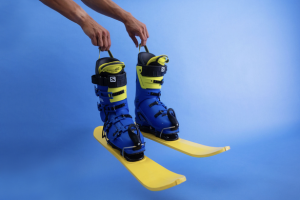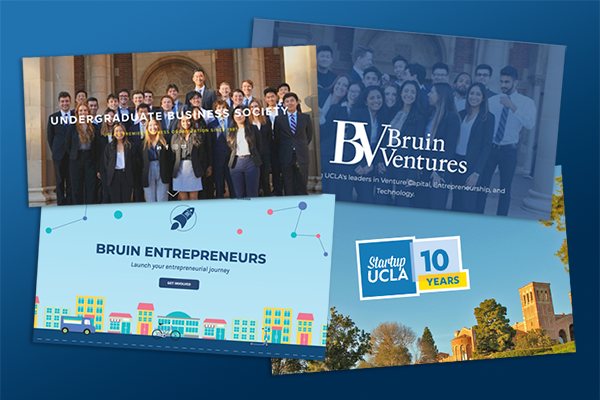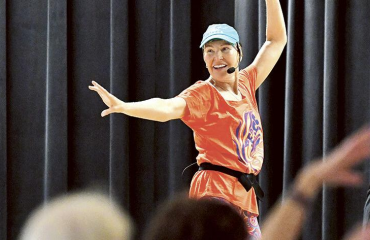Engineering Entrepreneurship | UCLA Samueli School Of Engineering – UCLA Samueli School of Engineering Newsroom
Jan 3, 2022
“For years, we had wanted to buy mini skis but found the brands to be unappealing and expensive,” said Lim, a third-year Ph.D. student studying mechanical engineering at UCLA. “As an engineer and designer team, we decided to make our own.”
Lim found a way to combine engineering and entrepreneurship, using his technical skills to design plastic mini skis with the purpose of making skiing more accessible and fun. He and his business partner created the company Banana Blades based on the product Lim created.

Lim isn’t the only Bruin who is both a student and business leader. UCLA offers a myriad of pathways and resources for engineering students interested in entrepreneurship to take their ideas to the next level.
For example, undergraduate engineering students must satisfy a technical breadth requirement designed to provide them with working knowledge of a field outside their major. One option is the technology management breadth, which includes courses about decision-making in startups, venture-backed initial public offerings (IPOs) and multinational corporations.
“When you are in a club that is predominantly business majors, you need to be able to speak their language,” said Prithvi Kannan, a fourth-year student studying computer science and a technology director for the Undergraduate Business Society (UBS) at UCLA. “The technology management technical breadth helped me develop that skill set.”
As part of the technology management breadth, students can take a range of courses listed under both the engineering and management departments. These classes allow students to gain a better understanding of the intersection of business and engineering.
“Through ENGR 111 [Introduction to Finance and Marketing for Engineers], I learned the fundamentals of finance and economics,” Kannan said. “And through ENGR 163 [Entrepreneurship and New Product Development for Engineers], I learned about creating products and businesses.”
General engineering courses can also aid students in their entrepreneurial endeavors by providing the technical skills necessary to carry out the invention of a product.

Tristan Que, a third-year computer science student, uses his computer science skills as the technical lead of the startup Zing, a no sign-up online chatting tool with a range of unique features.
“During the development of Zing, we met many problems and the solutions to them required good computer science fundamentals to understand,” Que said. “Overall, UCLA computer science programs prepared me well in terms of both theoretical and practical aspects.”
In addition to the technical breadth requirement for engineering students, UCLA offers an entrepreneurship minor for undergraduates, as well as a master’s program in engineering management.
There are also a number of entrepreneurship and business clubs and organizations at UCLA that engineering students can get involved in, including Bruin Entrepreneurs, Bruin Ventures, UBS and Startup UCLA. Clubs like these tend to have a technical or engineering element alongside the typical business or entrepreneurship focus.
“Traditionally, UBS has been centered around industries such as investment banking, consulting and other professional services, but as the world is changing, UCLA students also want resources for technology-centered industries,” Kannan said. “Coming from a background in South Campus and the tech world, I was interested in helping build out this latest division of the organization.”
“Entrepreneurship is all about charting new territory, so don’t be afraid to join traditionally North Campus organizations,” Prithvi Kannan said.
Although not exclusively designed for those who major in engineering or computer science, business and entrepreneurship organizations on campus can help students build their network and find new opportunities, particularly because students coming from a more technical background can provide a unique perspective that makes them a valuable asset.
“Entrepreneurship is all about charting new territory, so don’t be afraid to join traditionally North Campus organizations,” Kannan said. “The engineering mindset and process is surprisingly applicable to their types of problems, and the skills that we possess are valuable even outside of our majors.”
This past year, both Lim and Que participated in the Startup UCLA Summer Accelerator, a 10-week program that provides a workspace, legal services, guidance and mentorship to early-stage companies started by UCLA students. Throughout the program, students prepare to pitch their companies to local entrepreneurs and investors at the end of the summer.
Some summer accelerator companies have become very successful, such as Duffl, a grocery-delivery service that has raised more than $13 million in funding and was started by Brian Le, who studied electrical engineering at UCLA, and business economics and philosophy alumnus David Lin ’21. Yash Moondhra ’21, who recently graduated with a bachelor’s degree in computer science, developed the company’s software and conducted data analysis as the firm’s chief technology officer.
While not all business endeavors result in success, UCLA’s academic and extracurricular environment is conducive to entrepreneurship.
“Building a startup requires a lot of hard work, and sometimes you are not able to see any result, even after months of struggling,” Que said. “Knowing what to expect and managing it properly is very important. This requires a good mentality and a good knowledge of your current limit.”
While the process can be challenging, it can also be rewarding on its own merit, as entrepreneurship allows engineering students to turn their passions into careers.
“Listen to that whisper of curiosity,” Lim said. “Know what makes you happy, and do that.”
Chloe Slayter contributed to this story.



